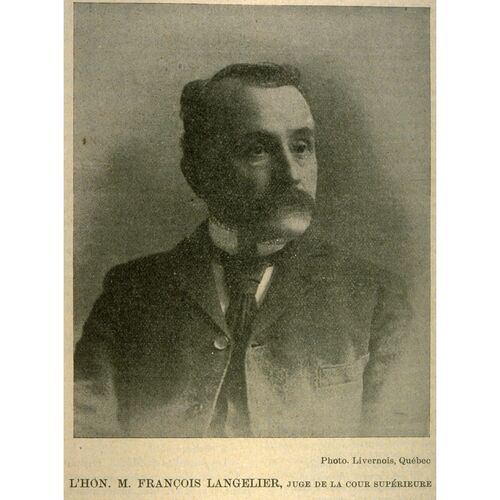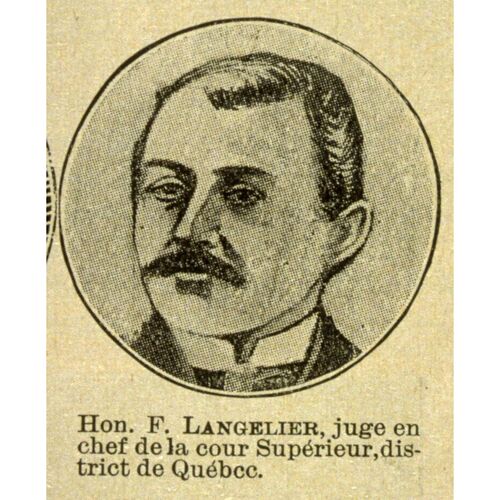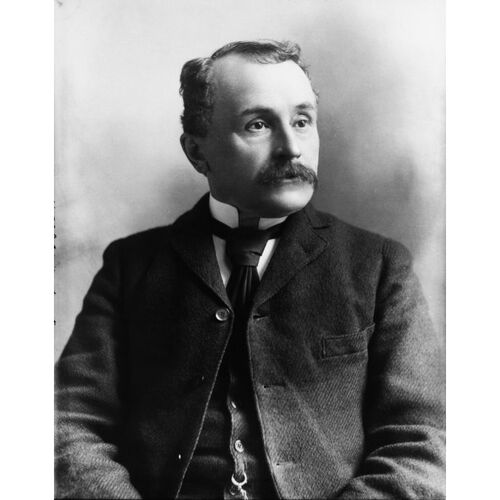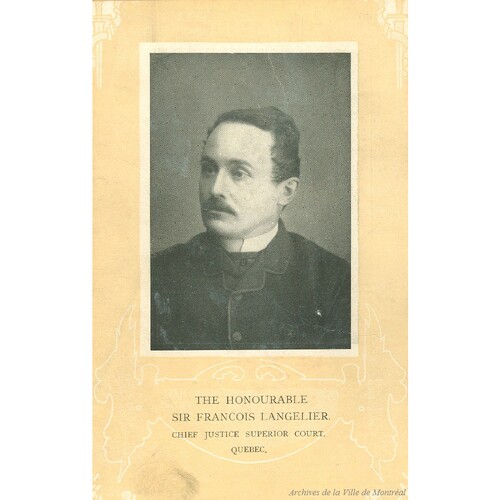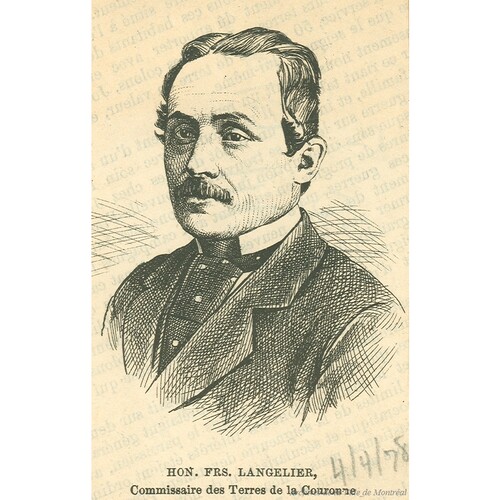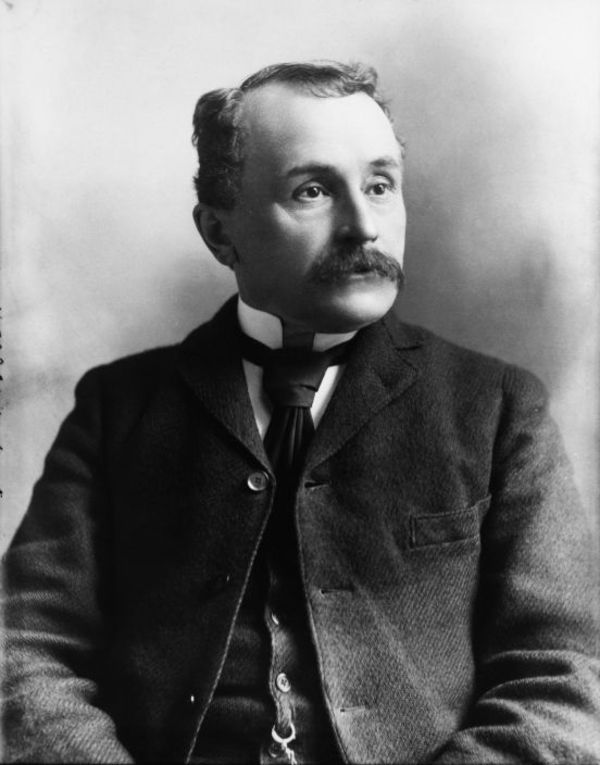
Source: Courtesy of Wikimedia Commons
LANGELIER, Sir FRANÇOIS (baptized François-Xavier), lawyer, professor, journalist, politician, lieutenant governor, and author; b. 24 Dec. 1838 in Sainte-Rosalie, Lower Canada, son of Louis-Sébastien Langelier, a farmer, and Julie-Esther Casault; m. first 2 Feb. 1864 Virginie Légaré in the parish of Saint-Roch at Quebec, and they had four children, three of whom died young; m. secondly 31 May 1892, in the parish of Notre-Dame de Québec, Marie-Louise Braün, niece of Charles-Alphonse-Pantaléon Pelletier, and they had three sons and two daughters; d. 8 Feb. 1915 at Spencer Wood, in Sillery, Que., and was buried 11 February in Saint-Charles cemetery at Quebec.
After studying at the Séminaire de Saint-Hyacinthe from 1851 to 1858, François Langelier went to the Université Laval at Quebec, where he received an llb in 1860 and an lll with great distinction in 1861. Although he was called to the bar of Lower Canada on 10 Oct. 1861, he did not practise immediately. Instead, at the suggestion of his uncle Abbé Louis-Jacques Casault*, he pursued his legal education at the Université de Paris from 1861 to 1863.
One of the few jurists of his generation to study abroad, Langelier was named associate professor in the faculty of law at the Université Laval on his return in 1863 and became a full professor in 1865. He taught an introductory course in civil law from 1863 to 1866, Roman law from 1865 to 1873, administrative law from 1866 to 1888, and civil law from 1872 to 1915. As well, he taught political economy in the faculty of arts as an associate professor from 1871 to 1915. Langelier’s classes were highly popular. Clear, precise, and simple, his language was easily grasped by students. According to one of them, Joseph-Mathias Tellier*, he had “the exceptional and wonderful ability to understand the law thoroughly and make others love it.” The publication of two scholarly works crowned his academic career: De la preuve en matière civile et commerciale (Québec, 1894) and Cours de droit civil de la province de Québec (6v., Montréal, 1905–11). More commentary than treatise, the second is a meticulous, sometimes bold analysis of the articles of the Civil Code; it is still used by lawyers and judges. He was also involved for many years in the administration of Laval. The registrar of the faculty of law from 1863 to 1866 and its dean from 1892 to 1915, he was a member of the university’s council from 1872 until his death.
From 1876 until he became a judge in 1898, Langelier practised law with his brother Charles. Didier Montambault joined them as third partner in 1878 and Joseph-Édouard Taschereau as a fourth from 1886 to 1892, with Charles Archer as his replacement in 1892 and 1893. Langelier was involved in several civil suits concerning clerical interference in the electoral process. He gained particular renown with the attempt to get the election of Hector-Louis Langevin* in Charlevoix in January 1876 annulled, undoubtedly the most famous and important of these cases. As counsel for the defeated candidate, Pierre-Alexis Tremblay*, Langelier went before Adolphe-Basile Routhier, an ultramontane judge. Seventeen charges were laid, and 175 witnesses took the stand over 35 days. In a moving and brilliant speech Langelier argued that the curés had recalled the horrors of the French revolution with its massacre of priests and destruction of religion; they had made their people fear a sudden death, had talked of false prophets, false Christs, and venomous serpents, and had conjured up “before their terrified eyes horrible phantoms and the abyss threatening to engulf them.”
On 15 Nov. 1876 Routhier denied the petition to annul the election, holding that the clergy enjoyed immunity where moral issues were involved, as in an election, and that their actions in such matters were exempt from state control. The case was appealed to the Supreme Court of Canada. Assisted by James Bethune, Langelier gave a three-hour speech. On 28 Feb. 1877 the five judges, including Jean-Thomas Taschereau*, brother of Archbishop Elzéar-Alexandre Taschereau* of Quebec, unanimously reversed Routhier’s ruling and declared that undue influence had been exerted in contravention of federal election laws. The bishops expressed their “profound distress” at this judgement. Langelier was accused of dragging the clergy before the courts in a most unjust and undignified manner. Conservative newspapers saw in his actions “a lack of piety, a heresy, a rebellion against the church,” and the ultramontanes called for his dismissal from the university. In a letter a few months later to Monsignor George Conroy*, apostolic delegate to Canada, Langelier admitted that had he foreseen the repercussions of the case, he would never have accepted it. He had even had to justify himself to Archbishop Taschereau, who finally agreed that he was right.
A true liberal, in both political and economic matters, Langelier had not been long in entering provincial politics. In 1871 he lost in Bagot to notary Pierre-Samuel Gendron*, but he won in Montmagny in a by-election on 16 Dec. 1873, defeating Philippe Landry. As a young member of the opposition, he spoke a number of times in the Legislative Assembly, addressing such subjects as education, immigration (which he claimed had a higher cost than benefit), the secret ballot (through which “everyone is free”), and individual liberty. His comments were always well informed; he drew on British and French parliamentary history, and often on the Bible. Nevertheless Landry took the seat from him in 1875. The ultramontanes had done everything possible to ensure his defeat. Langelier sued, claiming clerical interference; in May 1876 the Court of Revision annulled the election, but Langelier did not stand in the by-election that followed. He waited until the general election of 1878, when he ran successfully in Portneuf. On 8 March 1878 Premier Henri-Gustave Joly* named him commissioner of crown lands, an office he retained until 19 March 1879. Then, at short notice, “without having been . . . prepared by years of patient and continuous study of the financial affairs of the province,” Langelier was made treasurer to replace Pierre Bachand*, who had died in office. He held this post from 12 March to 31 Oct. 1879. Joseph Gibb Robertson*, his successor as treasurer after the Conservatives regained office, would express a low opinion of his financial abilities. The fall of the Joly government relegated Langelier to the opposition benches. At Quebec he was spoken of as a replacement for Joly, but his provincial political career ended in 1881 with his defeat in Portneuf.
Meanwhile, like many politicians of the time, Langelier dabbled in journalism. In 1871 and 1872, to assist his brother Jean-Chrysostome, who was the editor of La Nation, he wrote a “fairly daring” parliamentary column for that Saint-Hyacinthe paper. In 1880 he helped establish L’Électeur [see Ernest Pacaud*] at Quebec, becoming a regular contributor and source of inspiration. He reportedly also contributed to L’Opinion publique, which appeared in Montreal from 1870 to 1883, and he was to publish articles in L’Événement, as well as in La Revue légale from 1895 to 1897.
Langelier did not stay out of politics for long. He had been interested for many years in municipal affairs, as is evident from his first publication, Lettres sur les affaires municipales de la cité de Québec, a volume he had brought out in 1868 defending city officials. After losing to Jean-Docile Brousseau* in Quebec’s Saint-Louis ward in 1880, Langelier was elected city councillor for the wards of Saint-Jean in 1882 and 1884, Saint-Roch in 1886, and Palais in 1890. On 1 May 1882 the council unanimously chose him mayor, and he held this office until 1 March 1890; he then resigned, probably to avoid being attacked by an increasingly hostile council which hoped for his departure.
Langelier’s remarkable mayoralty changed the physical appearance of the provincial capital. He spent all his afternoons at the city hall, “neglecting his clients and his private affairs.” Sidewalks were built and repaired, and roads were paved and widened. Côte d’Abraham, Rue de la Montagne (Côte de la Montagne), Rue Saint-Paul, and Rue Saint-Joseph were macadamized. In 1887 electric lighting replaced gas. The question of a new city hall to house all municipal services was resolved: on 3 May 1889 the mayor signed a contract with the provincial government to purchase the site of the former Jesuit college for $20,000, and one of the clauses stipulated that a city hall would be built within five years. That project, so dear to Langelier, was only carried out six years after he had left the mayoralty. Under his administration the water mains were improved [see Horace Jansen Beemer] and the fire department was reorganized, measures that brought down insurance rates. He straightened out municipal accounting, which had been in bad shape when he arrived, and created a health service in 1884 and a local board of health in 1885 that soon established the first civic hospital for contagious diseases. In 1889 the city expanded with the annexation of Saint-Sauveur (the mayor’s name was given to Boulevard Langelier, a street in this ward); negotiations for amalgamation were also undertaken with the municipalities of Limoilou and Notre-Dame de Québec.
But Langelier had not been content for long with the municipal scene. In 1884 he had decided to enter federal politics. Successful in Mégantic in a by-election on 10 July, he was subsequently re-elected in Quebec Centre in 1887, 1891, and 1896. A member of the opposition until 1896, Langelier was a good debater who took a special interest in constitutional issues and parliamentary procedure. Like several of his francophone parliamentary colleagues, he usually made his speeches in English, with a slight accent, in order to be understood by mps from the other provinces. Privately, he described Ottawa as an “abominable hole,” where he felt out of place. In March 1886 he defended Louis Riel*: “If anyone stirred up the rebellion, it was this Government and not Riel,” he argued. “It was the state in which the negligence of the Government had put the half-breeds which was the first cause of all the troubles in the North-West.” He declared himself opposed to the death penalty for political crimes: Riel had been a “dangerous lunatic” who should have been sent to an insane asylum or to prison, not the gallows. Langelier did not mince words in this debate: he called the minister of militia and defence, Sir Adolphe-Philippe Caron*, a “Judas Iscariot.” In 1893 he spoke on electoral legislation, denouncing the buying and selling of votes, and in 1895 on emigration to the United States, which he saw as laden with tragic consequences. He deplored the fact that federal publicity in London made no mention of the province of Quebec.
In April 1896 Langelier participated in the debate on the remedial legislation aimed at restoring the rights of Roman Catholics in Manitoba schools. He declared: “I never yet met with a Bill of that importance so miserably framed. Evidently the framers of the Bill never intended to put it in operation.” Langelier was under strong pressure to side with the bishops, who supported the legislation. The rector of the Université Laval himself, Monsignor Joseph-Clovis-Kemner Laflamme*, asked him on 30 May to back the bishops on the question. Langelier answered that unless the bill was amended he would oppose it, for it was “positively harmful” to Manitoba’s Catholic minority. Repeated attacks upon Langelier, in which the Université Laval was often mentioned, led Laflamme to intervene, most notably with Thomas Chapais* after a series of articles in Le Courrier du Canada (Québec) criticizing the position of this “professor of a Catholic university” on the remedial bill. The rector wrote in January 1897 that the attacks were “of the sort to damage the university.” Chapais appealed to Bishop Louis-Nazaire Bégin*, coadjutor to the archbishop of Quebec, who replied: “Journalists can attack the politician, the private citizen, as much as they want. It has nothing to do with the university, so long as his position as professor is not mentioned.” He even admitted: “I am far from approving the conduct of M. Langelier in this matter.”
Langelier’s commitment to the Liberal cause was undeniable. Thus, in 1891, not for the first time, he had assumed responsibility for a debt owed by the party; he paid the $10,000 by selling his “house filled with fond memories.” He was well regarded by members of the party and was on good terms with its leader, Wilfrid Laurier. However, relations between the two men deteriorated after the 1896 election when Laurier bypassed him in choosing his cabinet. Langelier and his friends felt they had been excluded from power in favour of former Conservatives such as Joseph-Israël Tarte*. In a startling interview in the Montreal Daily Witness on 9 Dec. 1897 Langelier, pointing to his sacrifices and his 30 years of service to the Liberal party, denounced the immoral dealings between Liberals and Conservatives. To defuse the anger of Langelier’s allies, Laurier finally proposed a compromise: Louis-Amable Jetté would be named lieutenant governor and Langelier would replace him as a judge in Montreal. Langelier refused at first and considered remaining in politics as an independent Liberal, but he finally agreed for the sake of the party’s unity and interests, not wanting to cause “irreparable damage.”
Langelier resigned as mp on 14 Jan. 1898 and was appointed puisne judge of the Quebec Superior Court for the district of Montreal. Living in Montreal, he had to be temporarily replaced at the Université Laval. He continued, however, to sit on the Council of Public Instruction (appointed on 22 Dec. 1888, he would serve until 4 Nov. 1911). There he supported more practical and utilitarian education – he suggested that, in convents, music classes be replaced by instruction in shorthand, typing, and telegraphy – and he insisted that more attention be paid to primary schools. Langelier was eventually named acting chief justice of the court for the Quebec district on 6 June 1906. During his years on the bench, he heard on average a dozen cases a year, touching on all areas, but especially matrimonial, municipal, and electoral law. Langelier himself had once provoked a debate in the Legislative Assembly by an article he had written for La Nation in 1871 accusing mla Gendron of fraud, and now he sat on two trials concerning freedom of the press. Jules Fournier was brought to court for his article of 9 May 1909 in Le Nationaliste (Montréal) entitled “La prostitution de la justice,” which ridiculed the bench. Discussing political appointees, Fournier had written, “Under their ermine they remain the fanatics they have always been, the unconscious slaves of party spirit.” Feeling the attack was aimed at him, Langelier denounced in his judgement Fournier’s report of a trial over which he had presided as “an utter misrepresentation of a judicial decision” and sentenced him to three months in prison. Henri Bourassa* accused the judge of abuse of power and Olivar Asselin* refused to accept “the most revolting act recorded in judicial annals” of the province. These denunciations were harsh and they were not the only ones. Armand La Vergne* questioned Langelier’s credibility: he reportedly had favoured his nephews as counsel in certain cases. But such views were not held by all. At the time of Langelier’s death, Joseph-Mathias Tellier said that he had “the reputation of an enlightened, educated, and conscientious judge” and Edmund James Flynn* noted that he had “always been guided more by the law and a common sense approach than by what is called case law, [which is] often very contradictory and uncertain.”
Having aspired to the title for some 15 years, Langelier was finally sworn in as lieutenant governor of the province on 6 May 1911. His entire career, as well as his services to the Liberal party, justified his appointment. He had been made a qc for Quebec (9 March 1878) and for Canada (11 Oct. 1880), held honorary doctorates in law from the Université de Paris (1878), the Université Laval (1878), and Bishop’s College (1903), and had been bâtonnier of the Quebec bar (1885, 1887, and 1888). Former president of the Institut Canadien de Québec (1867–69) and the Council of Arts and Manufactures of the Province of Quebec (1891 and 1892), he had presided over the celebration of the tercentenary of Quebec City [see Albert Henry George Grey], and chaired the first temperance league in the city. Knighted in 1907, he was elected to the Royal Society of Canada in 1909 and was chairman of its French-language section from September 1910. Even though the office of lieutenant governor entailed a busy social schedule, Langelier enjoyed the pleasures of Spencer Wood. He devoted his leisure to his first passion, reading, and appreciated the new honours that crowned his career: knight of the Order of St John of Jerusalem in England in 1912 and knight of the Order of St Michael and St George on 31 Dec. 1913.
After a year-long illness, Sir François Langelier died in office at Spencer Wood on 8 Feb. 1915, at the age of 76. Contrary to custom, and in accordance with his wishes, he did not lie in state at the legislative building but at Spencer Wood. Tall, with a striking countenance, Langelier was considered a brilliant orator and spoke with ease, vigour, and elegance. He was also very sociable. Tireless despite his various activities, he was “a true public educator.” Even his opponents respected him; Tarte is said to have declared privately, “What a pity that he is not a Conservative.” Born “into a humble peasant home,” deceased “beneath the sumptuous panelling of the Spencer Wood château,” Langelier was, in the words of a colleague at the Royal Society of Canada, Ernest Choquette*, “one of the most perfect specimens that the French Canadian race could produce three-quarters of a century ago.”
Material concerning the life and career of Sir François Langelier is found in various Canadian archives, notably the AAQ, the ANQ-Q, the Arch. de la Ville de Québec, the ASQ, and the NA.
Le Canadien, 27, 29 juill. 1870; 3 janv. 1873; 20 avril, 30 oct. 1876; 2 févr. 1877; 9 févr. 1889. Le Courrier du Canada (Québec), 13 août 1875; 20, 22, 24 nov. 1876; 10, 17 janv. 1877; 18 janv. 1897. Daily Witness (Montreal), 9 Dec. 1897. L’Électeur (Québec), 3 mars 1890, 21 juin 1893. L’Événement, 25 nov. 1873; 7 sept. 1874; 31 juill., 23 sept. 1876; 2 avril 1877. Globe, 14 July 1896. Le Journal des Trois-Rivières (Trois-Rivières, Qué.), 13, 16 nov. 1876. Le Nationaliste (Montréal), 9 mai, 13, 20 juin 1909. Le Patriote (Sorel, Qué.), 20 mai 1891. Le Soleil, 22 févr. 1897; 12–14 janv. 1898; 10 déc. 1901; 15 juill. 1903; 2 févr. 1907; 4 mai 1911; 24 déc. 1913; 6 mai, 24 déc. 1914; 10–11 févr. 1915; 20 mars 1920; 6 mai 1922; 18 avril 1973. La Vérité (Québec), 12 janv. 1889.
L’Acte des élections fédérales contestées, 1874, district électoral de Charlevoix; O. Brassard et al., pétitionnaires vs l’Hon. H.-L. Langevin, défendeur; preuve de la part du défendeur ([Québec, 1876]). F.-J. Audet et al., “Les lieutenants-gouverneurs de la province de Québec,” Cahiers des Dix, 27 (1962): 239–41. Noël Bélanger, “Une introduction au problème de l’influence indue, illustrée par la contestation de l’élection de 1876 dans le comté de Charlevoix” (thèse de licence, univ. Laval, Québec, 1960). Georges Bellerive, Orateurs canadiens-français aux États-Unis; conférences et discours (Québec, 1908), 35–40. Can., House of Commons, Debates, 1886, 1893, 1895–96. Canada Gazette, 22 Jan. 1898: 1548; 16 June 1906: 2804. Canadian directory of parl. (Johnson). Canadian men and women of the time (Morgan; 1898). Ernest Choquette, “Sir François Langelier,” RSC, Trans., 3rd ser., 9 (1915), proc.: iv–vii. P.-A. Choquette, Un demi-siècle de vie politique (Montréal, 1936), 124–33. Alfred Cloutier, Sir François Langelier k.c.m.g., chevalier de l’ordre de Jérusalem, professeur de droit; étude sur sa carrière comme professeur (Québec, 1915). L.-M. Côté et al., Les maires de la vieille capitale (Québec, 1980). Cyclopædia of Canadian biog. (Rose and Charlesworth), vols.1, 3. Andrée Désilets, Hector-Louis Langevin, un Père de la Confédération canadienne (1826–1906) (Québec, 1969), 268–69, 294–301, 360–61, 400. J.-J. Deslauriers, La Cour supérieure du Québec et ses juges, 1849–1er janvier 1980 (Québec, 1980), 200. DPQ. Gazette officielle de Québec, 1888: 2340; 1890: 1898; 1911: 1884. J. Hamelin et al., La presse québécoise, 2: 96, 131, 147, 175–76; 3: 12, 215. M. Hamelin, Premières années du parlementarisme québécois. Françoise Lagasse, “Sir Hector-Louis Langevin et l’influence indue dans l’élection du comté de Charlevoix de 1876” (thèse de ma, Bishop’s Univ., Lennoxville, Qué., 1964). Charles Langelier, Souvenirs politiques; récits, études et portraits (2v., Québec, 1909–12). Mandements, lettres pastorales et circulaires des évêques de Québec, Henri Têtu et C.-O. Gagnon, édit. (19v. parus, Québec, 1887– ), [2]. Sylvio Normand, “Le doyen François Langelier (1838–1915),” Laval/Droit (Sainte-Foy, Qué.), 1, no.2 (automne 1991): 7. Prominent men of Canada (Adam), 140–43. Qué., Assemblée Législative, Débats, 1873–75, 1878–79, 1889, 1908, 1910–11 (as well as the manuscript text of the debates for the 1915 session held by the Service de la Reconstitution des Débats); Journals, 1908: 51. Rapport du surintendant de l’Instruction publique de la province de Québec (Québec), 1887–1910. Rapports judiciaires de Québec: Cour supérieure (Montréal), 1899–1911. Reports of the Supreme Court of Canada, comp. George Duval et al. (64v., Ottawa, 1878–1923), 1. P.-G. Roy, Les avocats de la région de Québec; Les juges de la prov. de Québec. Robert Rumilly, Hist. de la prov. de Québec, vols.1–4, 6, 8, 12, 19; Honoré Mercier et son temps (2v., Montréal, 1975). Joseph Schull, Laurier, H.-J. Gagnon, trad. ([Montréal], 1968), 414. O. D. Skelton, Life and letters of Sir Wilfrid Laurier (2v., Toronto, 1921). Univ. Laval, Annuaire, 1859–1915. René Vincent, “Sir François Langelier, 1838–1915,” Concorde (Québec), 10 (1959), nos.11–12: 34–35. J. S. Willison, Sir Wilfrid Laurier and the Liberal party: a political history (2v., Toronto, 1903), 2: 34–35.
Cite This Article
Jocelyn Saint-Pierre, “LANGELIER, Sir FRANÇOIS (baptized François-Xavier),” in Dictionary of Canadian Biography, vol. 14, University of Toronto/Université Laval, 2003–, accessed December 31, 2025, https://www.biographi.ca/en/bio/langelier_francois_14E.html.
The citation above shows the format for footnotes and endnotes according to the Chicago manual of style (16th edition). Information to be used in other citation formats:
| Permalink: | https://www.biographi.ca/en/bio/langelier_francois_14E.html |
| Author of Article: | Jocelyn Saint-Pierre |
| Title of Article: | LANGELIER, Sir FRANÇOIS (baptized François-Xavier) |
| Publication Name: | Dictionary of Canadian Biography, vol. 14 |
| Publisher: | University of Toronto/Université Laval |
| Year of publication: | 1998 |
| Year of revision: | 1998 |
| Access Date: | December 31, 2025 |


